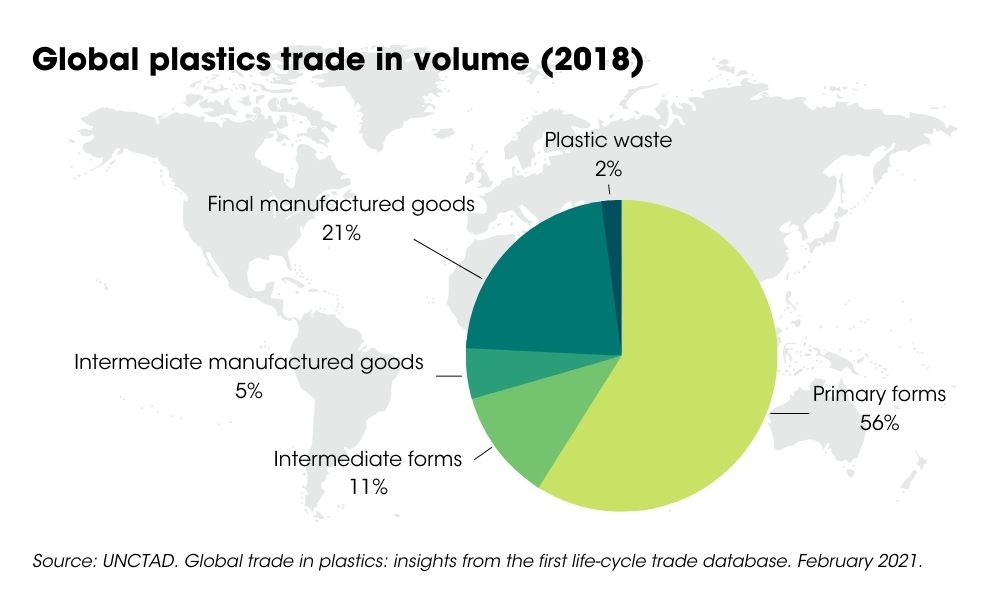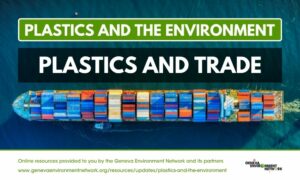Update
Plastics and Trade | Plastics and the Environment Series
International trade flows are central to the production, consumption and disposal of plastic products. Consequently, trade policy can play an important role in tackling the plastic pollution crisis. This page is part of our Plastics and the Environment series, a set of online resources on the plastics crisis, its impact on people and the environment, and international cooperation to address this global problem. They include resources and news from organizations in Geneva and beyond, including UN-system organizations and other IOs, governmental authorities, civil society organizations, academic institutions and journals, and renowned newspapers.
Global Trade in Plastics
Trade plays a central role in the global plastics economy. Across the life cycle of plastics, international trade is a vehicle for the spread of plastics across borders, whether as virgin plastic, embedded in products or as waste. According the UNCTAD, trade in plastics accounts for $1 trillion USD each year, which corresponds to about 5% of the total value of merchandise trade. In 2021, plastics trade reached records-high at 1.2 trillion USD. The challenge comes from the huge diversity of plastic products, including packaging and plastic embed in other products, that are traded globally and become part of the waste stream that countries are faced to manage, often unsuccessfully, resulting in leakages to the environment.

- Turning the Tide A Look Into the European Union to Southeast Asia Waste Trafficking Wave | United Nations Office on Drug and Crime in cooperation with UNEP and UNITAR| 2 April 2024
- Plastic Waste Trade | A New Colonialist Means of Pollution Transfer | Sedat Gündoğdu | Springer Cham | April 2024
- Trends in Trade Flows Across the Life Cycle of Plastics: Preliminary Review | TESS | 25 May 2023
- Australia quietly reopens plastic waste exports while UNEP “Turns on the Tap” for burning plastic waste in cement kilns: Policy desperation on the eve of Plastic Treaty negotiations | Break Free From Plastic | 23 May 2023
- Plastic Waste Trade. The Hidden Numbers | IPEN, The Last Beach Cleanup, The Microplastic Research Group and the Environmental Toxicology – Plastics Research Group | 7 March 2023
- Global plastics trade hits record $1.2 trillion | UNCTAD | 10 November 2022
- Global plastic trade 40% bigger than previously thought, study finds | UNCTAD | 3 March 2021
- Plastic Production and Trade in Small States and SIDS: The Shift Towards a Circular Economy | International Trade Working Paper 2021/01 | Diana Barrowclough and David Vivas Eugui | Commonwealth Secretariat | January 2021
- Global trade in plastics: insights from the first life-cycle trade database | Diana Barrowclough, Carolyn Deere Birkbeck & Julien Christen | UNCTAD Research Paper | December 2020
- IEH GUEST Lecture – The truth about plastics recycling and international trade | Geneva Environment Network | 8 May 2019
- The Trade in Plastic Waste | GRID-Arendal | 28 Apr 2017
Plastic Waste Trade
In 2018, about 8 million metric tonnes of plastic waste were traded internationally, amounting for around 3.3 billion USD. Plastic waste trade is a challenge, especially for importing developing economies where infrastructure to manage waste in an environmentally sound manner may be lacking. Since 2021, plastic waste trade is regulated under the Basel Convention. Learn more in our resource page below focused on waste management, recycling and trade.
Trade Policy to Tackle Plastic Pollution
As international trade flows are central to the production, consumption and disposal of plastic products, trade policy can play in important role in tackling the global plastic pollution crisis. Many countries are already taking actions, such as restricting imports or exports of plastic waste, banning single-use plastics, or using ecolabels to impact plastics trade. Experts on trade and the environment are calling for more concerted action to develop trade policy frameworks that support global action to end plastic pollution.
- World Trade Organization Members Agree to Help End Plastic Pollution | Pew Charitable Trust | 27 February 2024
- Ministerial Statement on Plastic Pollution and Environmentally Sustainable Plastic Trade | WTO | 26 February 2024
- Plastics Pollution Dialogue finalizes text for MC13 Ministerial Statement | WTO | 26 January 2024
- TESS Issues Statement at WTO Dialogue on Plastics Pollution Plenary Meeting | TESS | 1 February 2024
- Plastics Pollution Dialogue makes further headway on draft MC13 statement | WTO | 23 November 2023
- EU takes a step towards ending its harmful plastic waste exports – but still has some way to go | Environmental Investigation Agency | 17 November 2023
- Options for Trade-Related Cooperation on Problematic and Avoidable Plastics: Building on Existing Experiences with Single-Use Plastics| TESS Forum | 15 November 2023
- Trade-Related Policy Measures to Reduce Plastic Pollution: Building on the state of play | IISD | 30 May 2023
- Plastic Waste Power Play: The offshoring and recycling displacement involved in trying to recycle EU plastic waste | European Investigation Agency (EIA) | 16 January 2023
- Trade Provisions in Multilateral Environmental Agreements: Key Elements for Consideration in the Context of a Treaty to End Plastic Pollution | CIEL | December 2022
- Package-less and Reuse Systems Through Policy Intervention: rethinking packaging in international trade | Quaker United Nations Office | December 2022
- How trade can help end plastic pollution | World Economic Forum | 1 December 2022
- Tackling the Plastic Pollution Crisis: Crafting Trade Policy Solutions | IISD | 12 October 2022
- Plastic Pollution and Trade Across the Life Cycle of Plastics: Options for Amending the Harmonized System to Improve Transparency | Carla Vaca Eyzaguirre & Carolyn Deere Birkbeck | TESS | 19 May 2022
- Enabling Concerted Multilateral Action on Plastic Pollution and Plastics Substitutes | UNCTAD | 7 December 2021
- Material Substitutes to Address Marine Plastic Pollution and Support a Circular Economy: Issues and Options for Trade Policymakers | UNCTAD | 16 September 2021
- Trade and the Circular Economy: A deep dive into plastics action in Ghana | Global Plastic Action Partnership and WEF | 2 August 2021
- UNCTAD Paper Highlights Potential of Trade Policy to Reduce Plastic Pollution | IISD | 8 February 2021
- Geneva Beat Plastic Pollution Dialogues | Plastics and Trade | Geneva Environment Network | 4 February 2021
- Governing the Trade of Secondary Materials | Henrique Pacini (UNCTAD) and Tze Ni Yeoh | Chatam House | 4 February 2021
- The Role of Trade Policy in Plastic Waste Management | CUTS International | 16 November 2020
- Trade and trade policy in the fight against plastic pollution: What are the challenges and opportunities? | UNCTAD | 30 September 2020
- Plastics, the Circular Economy and Global Trade | World Economic Forum | July 2020
- Research Paper – The Political Economy of the Global Plastics Economy and Pollution: Production, Trade and Governance | Diana Barrowclough and Carolyn Deere Birkbeck | 9 January 2020
Plastic Pollution at the WTO
At the global level, governments have started to discuss the role of trade to address plastic pollution at the World Trade Organization (WTO). Since 2020, the Informal Dialogue on Plastics Pollution and Environmentally Sustainable Plastics Trade (IDP) explores how the WTO could contribute to efforts to reduce plastics pollution and promote the transition to more environmentally sustainable trade in plastics. Find more information in our dedicated page on international cooperation to address the plastic crisis.
More on the Plastics Crisis
Our special series “Plastics and the Environment” provides resources on the status of the global plastic pollution, its impact on people and the environment, and international cooperation to address the plastics crisis.


